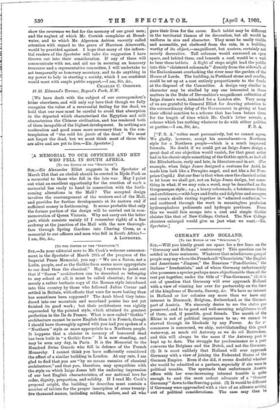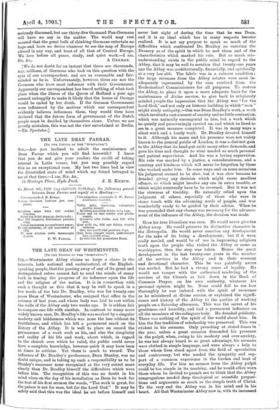GERMANY AND HOLLAND.
[To THE EDITOR OD THE "SPECTATOR."] you kindly grant me space for a few lines on the "Germany and Holland" controversy? This question can be settled in three sentences. Whatever that mischievous gang of people may say whom the French call "Chauvinists," the English and Americans "Jingoes," the Russians "Pan-Slavists," the Italians " Irredentists," and of whom Germany unfortunately also possesses a species perhaps more objectionable than all the rest put together, under the title of "Pan-Germans," (I) it is out of question that Germany will ever approach Holland with a view of winning her over for partnership on the lines of the kingdoms of Bavaria, Saxony, &c. We have no interest in Holland or her colonies any more than we have any interest in Denmark, Belgium, Switzerland, or the German part of Austria. We sincerely desire to see the status quo preserved, and to be good and well-meaning neighbours to all of them, and, if possible, good friends. The month of the Rhine is not of political importance to us; we cannot be starved through its blockade by any Power. As far Er commerce is concerned, we ship, notwithstanding this great waterway, as much via Antwerp as we do vici Rotterdam, and this will always be the same if the Antwerp port is kept up to date. The struggle for predominance as a port concerns the Belgians and the Dutch, and not the Germans. (2) It is most unlikely that Holland will ever approach Germany with a view of joining the Federated States of the German Empire. Even if she did, it seems doubtful whether she would be admitted as a partner, especially if she were in political trouble. The spectacle that unfortunate Austria offers with her ever-increasing internal trouble is quite enough to cool the most ardent advocate of a "Greater Germany" down to the freezing-point. (3) It would be different if Germany were approached with a view of an alliance arising out of political considerations. The case may then be
seriously discussed, but our thirty-five thousand Pan-Germans will have no say in the matter. The world may rest assured that the great bulk of thinking Germans entertain no hope and have no desire whatever to see the map of Europe altered in any way, and least of all that of Central Europe. We love before all peace, study, and quiet work.—I am,
[We do not doubt for an instant that there are thousands, nay, millions, of Germans who look on this question with the eyes of our correspondent, and are as reasonable and fair- minded as he is. Unfortunately, however, these are not the Germans who have most influence with their Government. Apparently our correspondent has heard nothing of what took place when the illness of the Queen of Holland a year ago seemed unhappily to make it likely that the house of Orange would be ended by her death. If the German Government were influenced by the motives which our correspondent evidently believes influences them, they would then have declared that the future form of government of the Dutch people must be decided by themselves alone. Unless we are greatly mistaken, this was not the view entertained at Berlin. —ED. Spectator.]











































 Previous page
Previous page